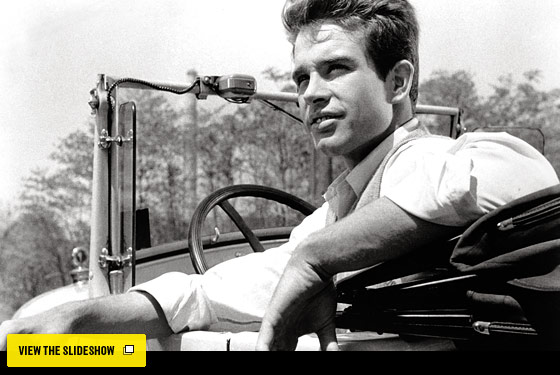
Marlon Brando once wrote of Elia Kazan—the man who made him a star in the stage and film versions of A Streetcar Named Desire—that he had “never seen a director who became as deeply and emotionally involved in a scene … he [once] got so wrought up that he started chewing on his hat.” Kazan was famously known as an actor’s director—some say the best ever—which he credited to starting as an actor himself. (He went on to co-found the Actors Studio, home of the Method technique.) In all, Kazan directed nineteen films—winning Best Director Oscars for Gentleman’s Agreement and his masterpiece, On the Waterfront—and launched the careers of Brando, James Dean, Eva Marie Saint, and Warren Beatty, among others. He favored unknowns, for their pliability and because they didn’t undermine the gritty, issue-driven stories he preferred. Kazan insisted on collaboration with his actors, but he was also a master manipulator, doing just about anything necessary to get the performance he wanted. As Kazan is quoted in the book Elia Kazan: Interviews: “I made them run around the set, I scolded them, I inspired jealousy in their girlfriends … You don’t deal with actors as dolls. You deal with them as … poets to a certain degree.” The results enraptured a boy who grew up to be one of the superstar directors of the next generation, Martin Scorsese. His A Letter to Elia, a documentary tribute, is included in the new boxed set “The Elia Kazan Film Collection,” which includes five films never before released on DVD.
The Elia Kazan Film Collection
20th Century Fox Home Entertainment. $199.98.

PEGGY ANN GARNER
A Tree Grows in Brooklyn (1945)
“A remarkable, unaffected performance by a great child actress, with an openness that’s heartbreaking. Kazan was proud of his work with her in this, his first picture. Justifiably.” (Garner won a special “juvenile” Academy Award.)
Photo: ” 20th Century Fox/Courtesy OF Everett Collection

MARLON BRANDO
On the Waterfront (1954)
“One of the most famous performances in cinema”it’s canonical”and, no matter how well you think you know it, Brando’s work in this movie is always fresh, exciting, surprising, deeply in the moment.” (Brando and Kazan worked together on three films: Streetcar, Viva Zapata!, and this one, for which Brando won the first of his two Academy Awards for Best Actor.)
ROD STEIGER
On the Waterfront
“Another famous performance, and it leaves me shattered each time I look at it. The look on his face when Brando says, “It wasn’t him, Charley, it was you,’ is an ocean of sadness and regret.” (Steiger was nominated for Best Supporting Actor.)
Photo: Courtesy of Everett Collection

JAMES DEAN
East of Eden (1955)
“In ALetter to Elia, I call it a performance that “doesn’t care what you think of it.’ Dean’s like a panther: dangerous, instinctive, intensely focused.” (Kazan had managed to tap into something very raw, and poignantly apropos to the part: “I thought,” Kazan told director George Stevens Jr., “that [Dean] was an extreme grotesque of a boy, a twisted boy. As I got to know his father ” and about his family ” I learned that he had been, in fact, twisted by the denial of love.” Dean died fifteen months after filming.)
RAYMOND MASSEY
East of Eden
“Kazan worried about whether or not he’d been fair to the father in this film. I wonder why. Massey plays a proudly pious man who doesn’t understand the effect his actions have on his sons. A powerful, touching performance.”
Photo: Courtesy of Everett Collection

PATRICIA NEAL
A Face in the Crowd (1957)
“Andy Griffith is front and center here, and he’s astonishing. But Neal is sharp as a knife, an ambitious woman who lets her own desires get the better of her. A sensual, ferocious piece of acting.”
Photo: Evans/Ronald Grant/Courtesy of Everett Collection

LEE REMICK
Wild River (1960)
“First of all, she’s beautiful, as expressively so as Lillian Gish. And the extreme delicacy of her work here never fails to move me. Kazan created an economy of gesture between her and Montgomery Clift that is breathtaking, especially in the scene where they return to the house, one of the greatest in American cinema.”
Photo: “20th Century Fox/Courtesy of Everett Collection

WARREN BEATTY
Splendor in the Grass (1961)
“This was his first movie, and he instantly commands the screen. He’s beautiful and magnetic and so heartbreakingly boyish. It’s very much a film about being a woman, but it’s also about Bud’s emotional education.” (Kazan wrote in his autobiography that Beatty had “more chutzpah than any Jew I’ve ever known. Even more than me.”)
Photo: Courtesy of Everett Collection
